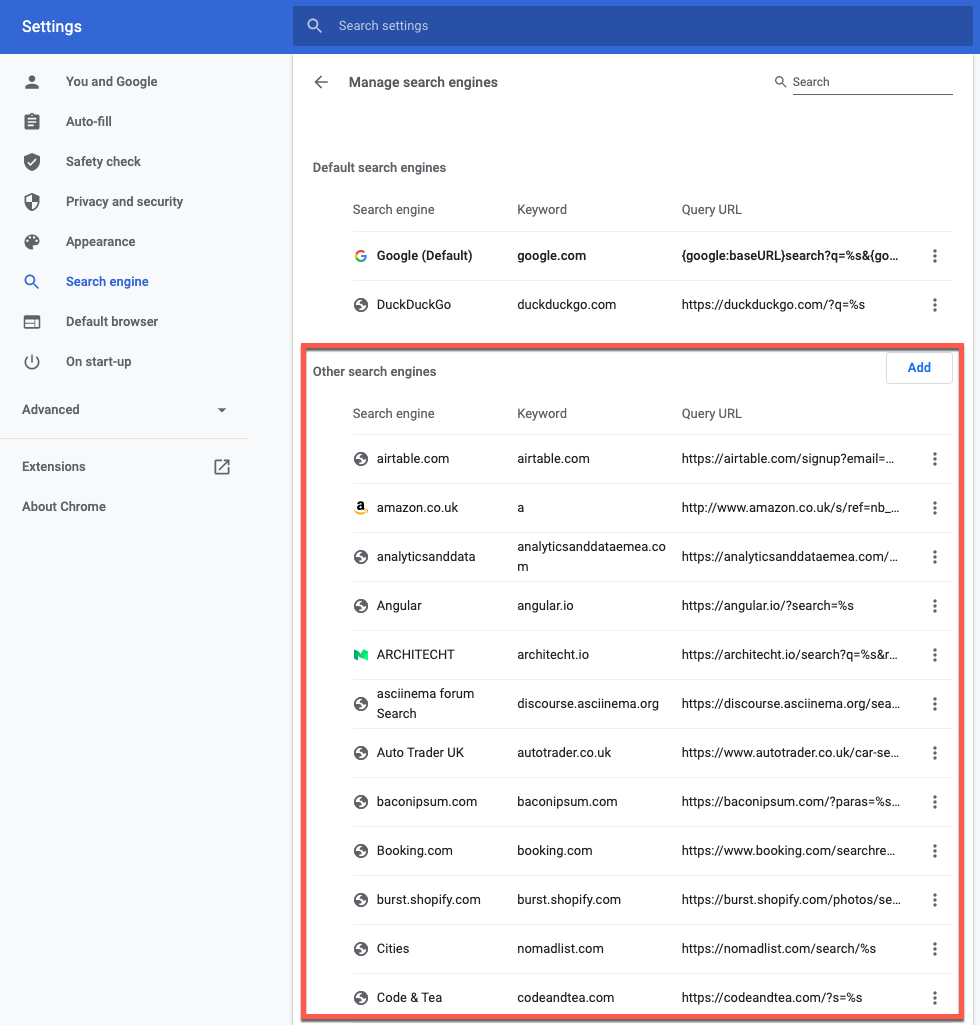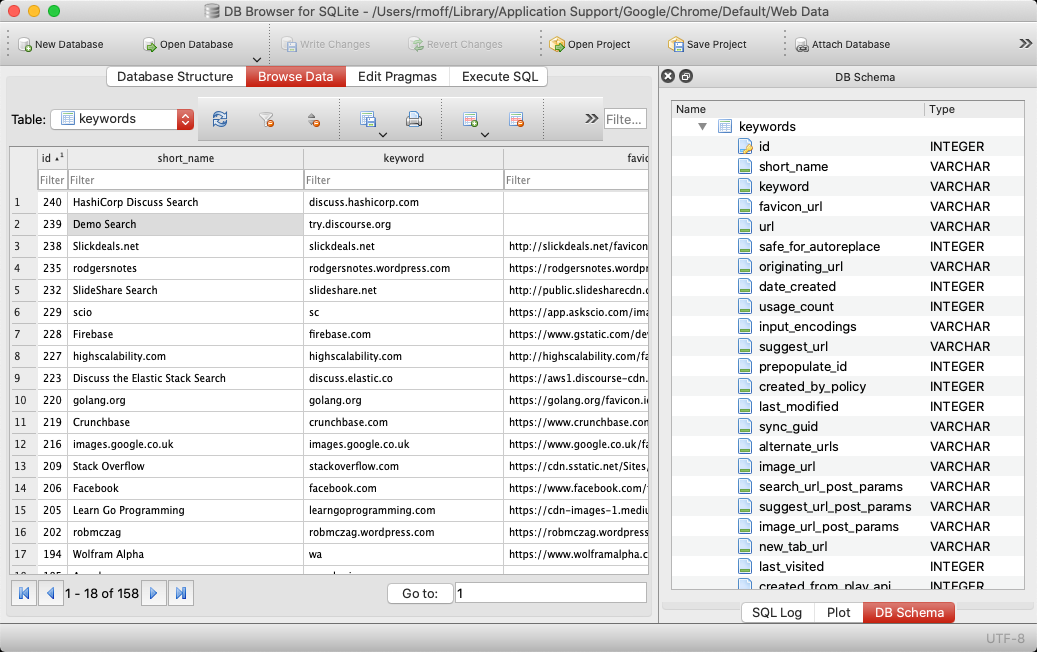Google Chrome automagically adds sites that you visit which support searching to a list of custom search engines. For each one you can set a keyword which activates it, so based on the above list if I want to search Amazon I can just type a <tab> and then my search term

Head to preferences and Manage search engines and you’ll see:

But what about if you don’t want all of these search engines there? You can delete them one by one, but that’s laborious. Let’s see if we can do better.
| ⚠️ This is completely unsupported, do at your own risk, etc |
First up, close Google Chrome, because we’re about to muck about with it and things will probably not be good if it’s running whilst we do it.
A sensible thing to do first is to take a backup:
cp ~/Library/Application\ Support/Google/Chrome/Default/Web\ Data ~/chrome_webdata.bakNow we can take a look at the SQLite database that stores the search engine (and other) data.
➜ sqlite3 ~/Library/Application\ Support/Google/Chrome/Default/Web\ Data
SQLite version 3.28.0 2019-04-15 14:49:49
Enter ".help" for usage hints.
sqlite> .tables
autofill meta
autofill_model_type_state payment_method_manifest
autofill_profile_emails payments_customer_data
autofill_profile_names payments_upi_vpa
autofill_profile_phones server_address_metadata
autofill_profiles server_addresses
autofill_profiles_trash server_card_cloud_token_data
autofill_sync_metadata server_card_metadata
credit_cards token_service
keywords unmasked_credit_cards
masked_credit_cards web_app_manifest_sectionIf the SQLite CLI is your thing then you can stick around here, but for poking around I found a GUI easier. DB Browser for SQLite is available on most platforms. On the Mac you can run:
brew cask install db-browser-for-sqliteThe table that holds the search engine config is called keywords

Which search engines have never been used? 🔗
There’s tons of fields, including information about when the entry was created and was last used. With this information we can run some SQL to analyse the list:
SELECT CASE
WHEN last_visited = 0 THEN 'never'
ELSE 'yes'
END AS USED,
COUNT(*)
FROM keywords
GROUP BY CASE
WHEN last_visited = 0 THEN 'never'
ELSE 'yes'
END;never 126
yes 32Since there’s a bunch there, let’s clear them out.
| ⚠️ This is completely unsupported, do at your own risk, etc |
DELETE FROM keywords WHERE last_visited =0;This didn’t seem to take any effect, even with Chrome closed, even having signed out of Sync. If you’ve any suggestions on how to make it persist then do let me know :)
When did you last use the search engine? 🔗
SELECT short_name, last_visited,DATETIME(last_visited / 1000000 + (STRFTIME('%s', '1601-01-01')), 'unixepoch', 'localtime') FROM keywords ORDER BY last_visited DESC;amazon.co.uk 13244032138725921 2020-09-08 10:48:58
images.googl 13244031156625704 2020-09-08 10:32:36
LinkedIn 13244030586371852 2020-09-08 10:23:06
ksqlDB issue 13244029597778579 2020-09-08 10:06:37
Twitter 13243959593811733 2020-09-07 14:39:53
Google Maps 13243697309712953 2020-09-04 13:48:29Check out the format of the datetime field - courtesy of StackOverflow I found out that it is the number of microseconds since January, 1601. Unix epoch not good enough for you?… 😉
We can break this down further, and look at which search engines I have used but not for the last 90 days (~3 months)
SELECT short_name, DATETIME(last_visited / 1000000 + (STRFTIME('%s', '1601-01-01')), 'unixepoch', 'localtime') AS last_visited
FROM keywords
WHERE JULIANDAY(date()) -
JULIANDAY(DATETIME(last_visited / 1000000 + (STRFTIME('%s', '1601-01-01')), 'unixepoch', 'localtime'))
> 90
ORDER BY last_visited DESC;news.google.com 2020-06-05 17:24:23
elixir-lang.org 2020-06-02 16:32:16
IMDb 2020-01-14 11:39:32
Neo4j Online Co 2019-12-06 12:15:55
Vimeo 2019-11-14 17:21:57
help.getpocket. 2019-09-29 14:41:20
GitHub 2019-08-06 21:54:48